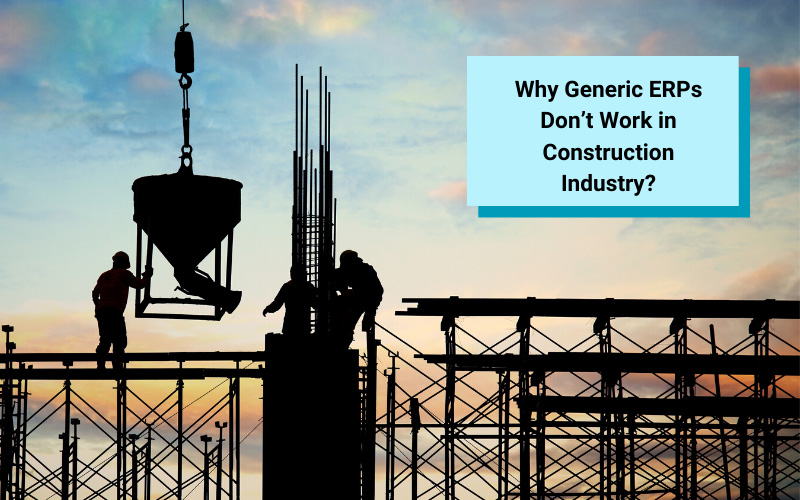The uniquely designed Construction ERP software for construction industries is more dynamic in nature. These Construction ERP solutions include specialized features that can drill into the functional needs of the construction Industries and fit into the mix. Unfortunately, generic ERP systems lack these capabilities and their usage may give rise to issues of concerns.
"Organizations with broken systems typically suffer from broken business processes and vice versa"
- Phil Simon
Let’s take a look at the shortcoming of generic ERP systems when used to manage construction Industries.
Improper project scheduling
Your business may deal with multiple construction projects at the same time. Managing them effectively is the key to successfully complete them within the designed time. Construction ERP software induces superior business performance and helps you gain happier clients.
Now, think about these tasks without the aid of proper project scheduling systems. It is near to impossible to keep track of every operation associated with each project and ensure that they function in the right order. Thus, with missing project tracker in a generic ERP software used by builders, you would be unable to manage extensive schedules and produce expected results.
Your projects need personnel, equipment, and other resources. Improper estimation of any of these increases the risks of project failure.
Inadequate contract and purchase order management
Effective contract and purchase order management have a greater influence on the well-being of your construction business. Maintaining these records accurately not only saves your business from future disputes like order duplication but also improves tracking of payments and expenses. Thus, leads to better control of finance and projects being completed within budget and as scheduled.
Using generic ERP Software in construction business eliminates this possibility. With no proper document tracking mechanism, your business would fail to gain the benefits that is otherwise easily available.
Facility for equipment maintenance planning
Well-maintained equipment has longer life and functions with maximum efficiency. Also, timely maintenance of machines minimizes breakdowns and make repairs quicker to fix.
Your construction process involves multiple types of machinery and so it needs a relevant tool to enable you to plan and keep track of every stage in scheduled maintenance. A generic ERP system has a lesser chance to include such industry-specific modules that can handle equipment maintenance. Hence, you would need a dedicated construction ERP software to fulfill this requirement.

Unavailability of field reporting feature
Keeping note of every business activity is necessary, especially when they are happening away from the company premise, at the construction site.
For managing this, you need a Construction ERP software with field reporting module to connect with your field team, update data without the risk of loss or duplicity, and quickly share the relevant information with the concerned departments.
Since field reporting is required only in specific industries, the module to manage this is absent in a generic ERP software and hence it fails to support.
Lack of appropriate billing system
Generic ERP systems may not be integrated with the billing tool, leading to delays in payment, material procurement, and other potential issues.
Therefore, you need a tailor-made construction ERP software, integrated with a billing module to automate invoice generation and speed up the payment process. It acts as a great time-saver and also ensures that you never forget to send bills on time.
Maintaining a separate billing system consumes additional time in data integration, which increases the operational costs and also delays decision making
CRM not integrated
CRM is used for managing clients, sales, and related operations. When your ERP system is not integrated with CRM, you would not be able to manage your clients, their contact information, communicate with them properly, keep them updated about the latest developments, and therefore experience lesser proximity to close deals or extend services.
All-in-all generic ERP systems are capable of handling multiple business operations, however, there are certain processes that are specifically followed in the construction industry, which this solution lacks to support.
At Focus Softnet, we understand the criticality of your business and designs the best ERP software for construction industry that provides you with functionality and flexibility you are looking for to perfectly manage the office and field operations.
Click here to find out more about how we can help you achieve your business goals.









